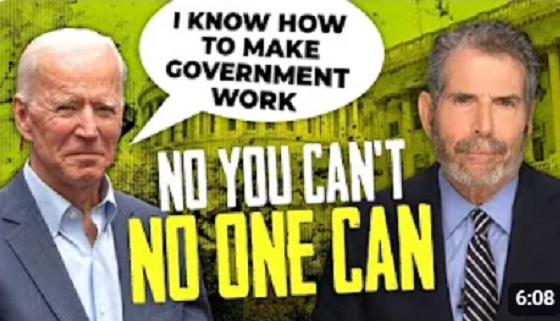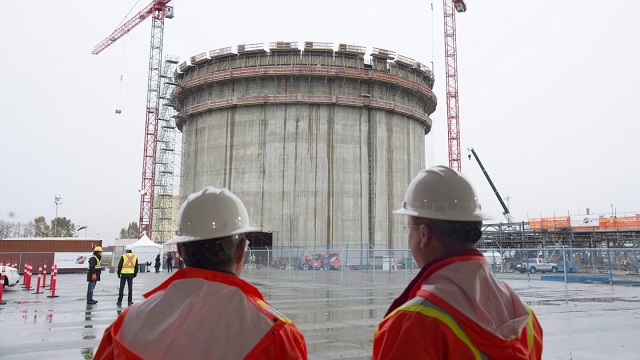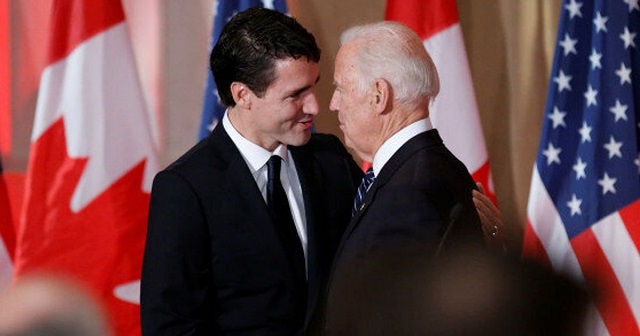Opinion
The Climate-Alarmist Movement Has A Big PR Problem On Its Hands

 From the Daily Caller News Foundation
From the Daily Caller News Foundation
By David Blackmon
The whole “net-zero by 2050” narrative that cranked up in earnest in early 2021 has now become a public relations problem for the climate-alarm movement, according to a senior official at the United Nations.
Chris Stark, the outgoing chief executive of the UN’s Climate Change Committee (CCC), said as reported by the Guardian: “Net zero has definitely become a slogan that I feel occasionally is now unhelpful, because it’s so associated with the campaigns against it. That wasn’t something I expected.”
As seems to always be the case among the globalist sponsors of this government-subsidized rush to saddle the world with unreliable power grids and short-range electric cars, the conversation among the leaders of the movement immediately moves not to perhaps reconsidering the approach to address public concerns, but to rejiggering the narrative. Stark recommends shifting the label and the narrative to more of a focus on investment and how renewables and EVs somehow improve energy security.
“We are talking about cleaning up the economy and making it more productive – you can call that anything you like,” he said.
That would be a neat trick, inventing a narrative about benefits that don’t really exist. But it wouldn’t be the first time it’s been tried.
At last November’s COP 28 conference, UN Secretary General Antonio Guterres floated the term “climate collapse” as a new name for what the climate alarmists have successively called “global warming,” “climate change,” “climate crisis,” and “climate emergency.” Each successive label has been replaced as its cache’ with the public has faded; and apparently the whole “climate emergency” has lost its punch, so another fright narrative must be concocted.
The trouble there, of course, is that the climate is not collapsing. But then again, it isn’t in any sort of an emergency, either, or a crisis.
The climate is always changing, though, so at least the long-abandoned “climate change” label had the ring of truth to it. Maybe let’s go back to that and try to deal with something that is at least a real thing? But, no, that would cut down on the alarm and make it harder for political leaders to enact bad “solutions” and subsidize them with debt combined with skyrocketing utility bills for average citizens.
So, as Stark says, call it anything you want, just so long as it is alarming. Stark’s boss at the UN, Guterres, used the term “global boiling” to describe the current climate situation. So, maybe we change “net-zero by 2050” to “no bubbles by 2050.” That would at least have the advantage of some semblance of consistent thought.
A colleague suggested that we simply change the problematic label to “Stone Age,” since that is where we are heading if the alarmists continue to get their way. She has a point.
The most amazing thing about Stark’s concerns is that anyone is really surprised that “net-zero by 2050” has become a problematic term. How else would officials at the UN and other governments expect the public to react to what has become the umbrella label for a set of authoritarian government actions that have destabilized power grids, caused the cost of living to rise rapidly, reduced consumer choice, and begun to rob citizens in nominally “free” countries of their individual rights?
The central problem today with this climate change narrative is that it has gone on for so long that is has become a bit of a joke with an increasingly aware and skeptical public. And the reason they’re skeptical is not due to any disbelief in science, as the alarmists invariably claim, but because they have seen nothing but bad outcomes and personal deprivations from the alleged solutions being subsidized into existence.
Stark assures us that, “the lifestyle change that goes with this is not enormous at all,” but painful results to date tell another story.
If Stark were truly thoughtful and serious about wanting to deal with the increasing unpopularity of the “net-zero by 2050” construct, he would suggest that everyone take a step back and re-evaluate the nature and effectiveness of the solutions being pushed.
By merely advocating for the concoction of yet another shift in the narrative, a troublesome lack of sincerity is laid bare.
David Blackmon is an energy writer and consultant based in Texas. He spent 40 years in the oil and gas business, where he specialized in public policy and communications.
Fraser Institute
Trudeau and Ford should attach personal fortunes to EV corporate welfare

From the Fraser Institute
By Jason Clemens and Tegan Hill
Last week, with their latest tranche of corporate welfare for the electric vehicle (EV) sector, the Trudeau and Ford governments announced a $5.0 billion subsidy for Honda to help build an EV battery plant and ultimately manufacture EVs in Ontario. Here’s a challenge: if politicians in both governments truly believe these measures are in the public interest, they should tie their personal fortunes with the outcomes of these subsidies (a.k.a. corporate welfare).
One of the major challenges with corporate welfare is the horrendous economic incentives. The politicians and bureaucrats who distribute corporate welfare have no vested financial interest in the outcome of the program. Whether these programs are spectacularly successful (or more likely spectacular failures), the politicians and bureaucrats experience no direct financial gain or loss. Simply put, they’re investing taxpayer money, not their own.
Put differently, the discipline imposed on investors in private markets, such as the risk of losing money or even going out of business, is wholly absent in the government sector. Indeed, the history of corporate welfare in Canada, at both the federal and provincial levels, is rife with abject failures due in large measure to the absence of this investing discipline.
In the last 12 months in Ontario, automakers have been major beneficiaries of corporate welfare. The $5.0 billion for Honda is on top of $13.2 billion to Volkswagen and $15.0 billion to Stellantis. That equates to roughly $979 per taxpayer nationally for federal subsidies and an additional $1,372 for Ontario taxpayers. And these figures do not include the debt interest costs that will be incurred as both governments are borrowing money to finance the subsidies.
And there’s legitimate reason to be skeptical already of the potential success of these largescale industrial interventions by the federal (Liberal) and Ontario (Conservative) governments. EV sales in both Canada and the United States have not grown as expected by governments despite purchase subsidies. Disappointing EV sales have led several auto manufacturers including Toyota and Ford to scale-back their EV production plans.
There are also real concerns about the practical ability of EV manufacturers to secure required materials. Consider the minerals needed for EV batteries. According to a recent study, 388 new mines—including 50 lithium mines, 60 nickel mines and 17 cobalt mines—would be required by 2030 to meet EV adoption commitments by various governments. For perspective, there were a total of 340 metal mines operating across Canada and the U.S. in 2021. The massive task of finding, constructing and developing this level of new mines seems impractical and unattainable, meaning that EV plants being built now will struggle to secure needed inputs. Indeed, depending on the type of mine, it takes anywhere from six to 18 years to develop.
Which brings us back to the Trudeau and Ford governments. Given the economic incentive problems and practical challenges to a large-scale transition to EVs, would members of the Trudeau and Ford governments—including the prime minister and premier—want to attach a portion of their personal pensions to the success of these corporate welfare programs?
More specifically, assume an arrangement whereby those politicians would share the benefits of the program’s success but also share any losses through the value of their pensions. If the programs work as marketed, the politicians would enjoy higher valued pensions. But if the programs disappoint or even fail, their pensions would be reduced or even cancelled. Would these politicians still support billions in corporate handouts if their personal financial wellbeing was tied to the outcomes?
As the funding of private companies to develop the EV sector in Ontario continues with the support of taxpayer subsidies, Ontarians and all Canadians should consider the misalignment of economic incentives underpinning these subsidies and the practical challenges to the success of this industrial intervention.
Authors:
Media
CBC tries to hide senior executive bonuses

From the Canadian Taxpayers Federation
Author: Franco Terrazzano
The Canadian Taxpayers Federation filed a complaint with the Office of the Information Commissioner after the CBC refused to disclose 2023 bonuses for its eight senior executives until days after its President Catherine Tait is scheduled to appear at a parliamentary committee.
“This reeks of the CBC trying to conceal its senior executive bonuses so Tait doesn’t have to talk about it when she testifies at a parliamentary committee,” said Franco Terrazzano, CTF Federal Director. “The CBC is required to follow access to information laws and this nonsense delay is a blatant breach of the law.
“If Tait and her executives think they deserve their bonuses, they should be open and honest about it with taxpayers.”
The CBC proactively discloses certain information related to executive compensation in its annual reports. However, because the annual report lumps together salary and other benefits, Canadians don’t know how much the CBC’s eight senior executives take in bonuses.
Other Crown corporations have provided the CTF with access-to-information records detailing senior executive bonuses. For example, the Canada Mortgage and Housing Corporation paid out $831,000 in bonuses to its 10 senior executives in 2023. The Bank of Canada paid out $3.5 million in bonuses to its executives in 2022.
On March 11, 2024, the CTF filed an access-to-information request seeking details on the compensation paid out to CBC’s eight senior executives in 2023, including bonuses.
On April 9, 2024, the CBC issued a 30-day extension notice.
The new deadline for the CBC to release details on senior executive bonuses is May 10, 2024, just days after Tait is scheduled to appear at committee on May 7, 2024.
In response to a previous access-to-information request, the CBC released to the CTF records showing it paid out $15 million in bonuses to 1,143 non-union staff in 2023. The CBC did not issue an extension notice on that request.
“Tait is wrong to hide the cost of bonuses for CBC’s eight senior executives from the Canadians who pay their cheques,” said Terrazzano. “Tait must do the right thing and confirm to the parliamentary committee that she will cancel CBC bonuses.”
The CTF filed the complaint with the Office of the Information Commissioner on May 3, 2024, regarding the CBC’s delay in releasing documents regarding senior executive bonuses.
“The CBC is legally obligated to release the bonus documents days after the parliamentary committee hearing so obviously Tait has the details readily at hand,” said Terrazzano. “If MPs ask for those details, she needs to answer.
“And just to be clear, the CTF is fine with the CBC releasing this information at committee or anywhere else.”
-

 John Stossel2 days ago
John Stossel2 days agoWhy Biden’s Just Wrong: NO ONE “Knows How to Make Government Work.”
-

 illegal immigration2 days ago
illegal immigration2 days agoFlight Docs Reveal Which Cities Are Receiving Migrants Under Biden’s Parole Program
-

 COVID-192 days ago
COVID-192 days agoStates move to oppose WHO’s ‘pandemic treaty,’ assert states’ rights
-

 Environment2 days ago
Environment2 days agoJournalism Misrepresent Climate Science
-

 Automotive2 days ago
Automotive2 days agoVehicle monitoring software could soon use ‘kill switch’ under the guise of ‘safety’
-

 Canadian Energy Centre2 days ago
Canadian Energy Centre2 days agoNorth America LNG project cost competitiveness
-

 Energy1 day ago
Energy1 day agoNet Zero’s days are numbered? Why Europeans are souring on the climate agenda
-

 Bruce Dowbiggin1 day ago
Bruce Dowbiggin1 day agoIt Gets Late Early These Days: Time To Bounce Biden & Trudeau?








